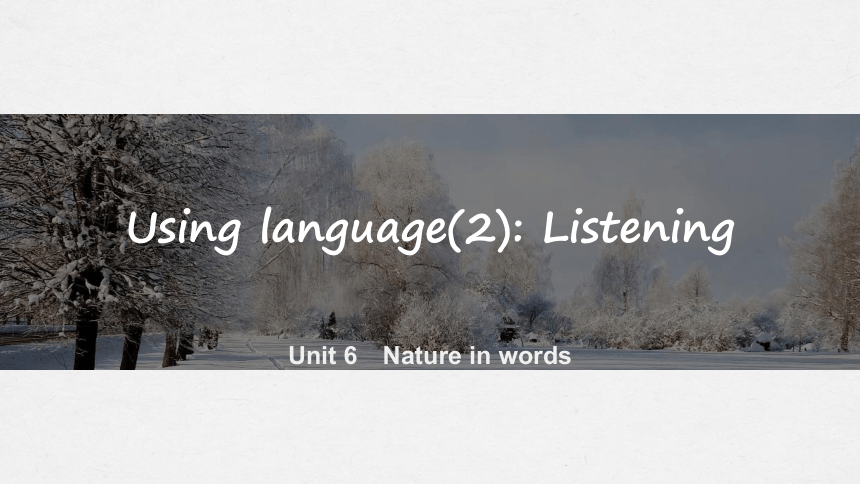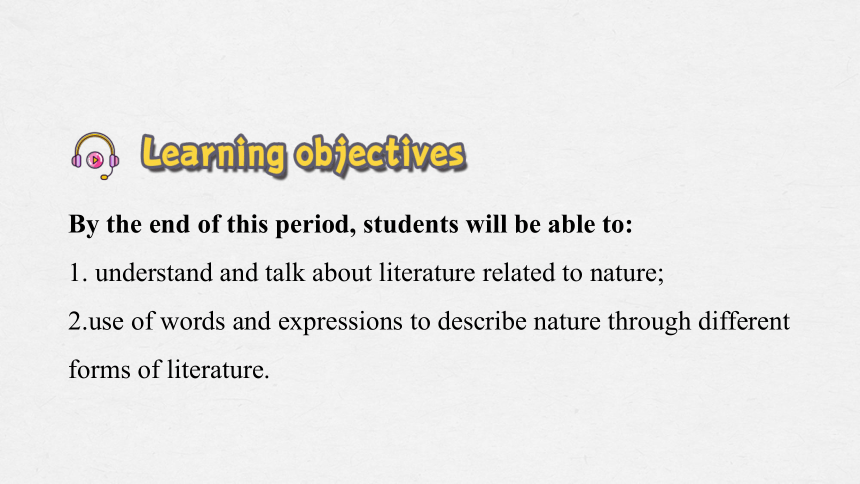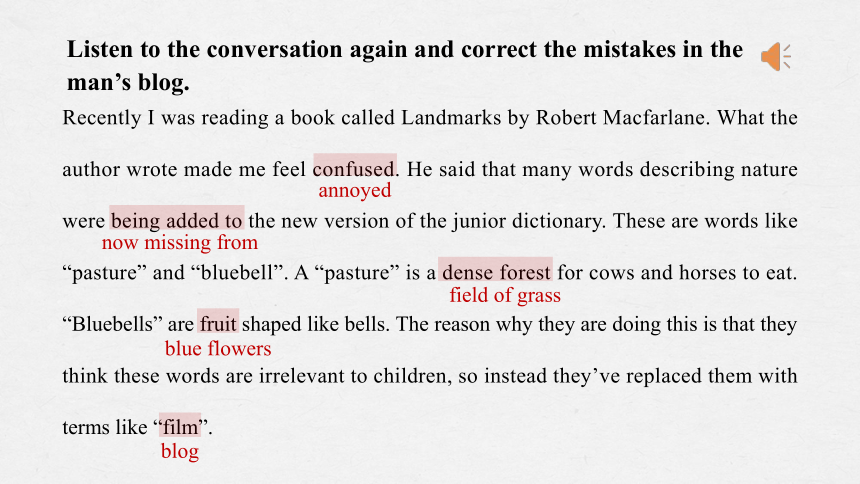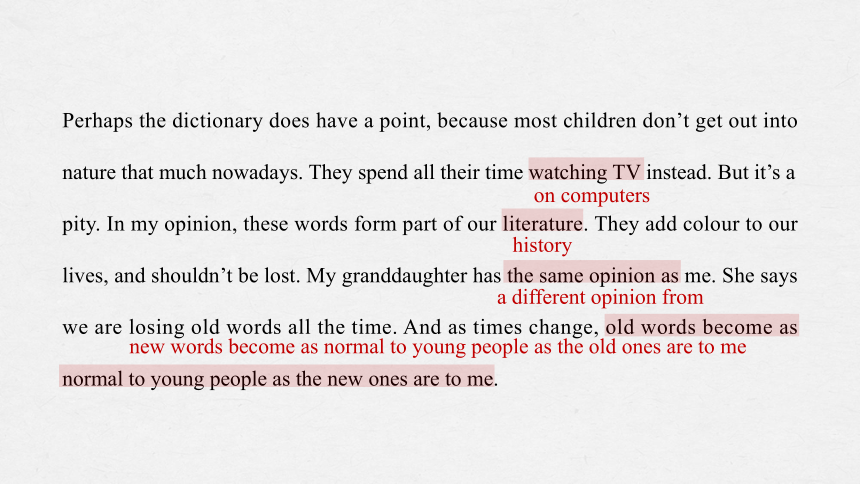外研版(2019)选择性必修三 Unit6 Nature in words Using language(2)课件 (共12张PPT)
文档属性
| 名称 | 外研版(2019)选择性必修三 Unit6 Nature in words Using language(2)课件 (共12张PPT) |  | |
| 格式 | pptx | ||
| 文件大小 | 14.0MB | ||
| 资源类型 | 教案 | ||
| 版本资源 | 外研版(2019) | ||
| 科目 | 英语 | ||
| 更新时间 | 2024-04-28 22:04:27 | ||
图片预览






文档简介
(共12张PPT)
Unit 6 Nature in words
Using language(2): Listening
By the end of this period, students will be able to:
1. understand and talk about literature related to nature;
2.use of words and expressions to describe nature through different forms of literature.
Open a dictionary, and you’ll be surprised to find that there are many more words about nature than you would think. There are various ways to describe the things we see in the natural world, no matter whether it’s a flower, a weed, an animal or the rain. For example, there are many ways to describe the different sounds of birds, such as chatter, chirp, cluck, hoot and tweet. These words can help us to write vivid descriptions of nature.
Listen to the conversation and answer the questions.
1. What book was the man reading
The man was reading a book called Landmarks.
2. Why was the man annoyed
Many words describing nature were now missing from the new version of the junior dictionary.
3. What was the girl’s opinion
Maybe the dictionary has a point. Most children don’t get out into nature that much nowadays. They spend much of their time on computers, for instance. She thinks the new terms they added are words we hear in our everyday use.
Recently I was reading a book called Landmarks by Robert Macfarlane. What the author wrote made me feel confused. He said that many words describing nature were being added to the new version of the junior dictionary. These are words like “pasture” and “bluebell”. A “pasture” is a dense forest for cows and horses to eat. “Bluebells” are fruit shaped like bells. The reason why they are doing this is that they think these words are irrelevant to children, so instead they’ve replaced them with terms like “film”.
annoyed
now missing from
field of grass
blue flowers
blog
Listen to the conversation again and correct the mistakes in the man’s blog.
Perhaps the dictionary does have a point, because most children don’t get out into nature that much nowadays. They spend all their time watching TV instead. But it’s a pity. In my opinion, these words form part of our literature. They add colour to our lives, and shouldn’t be lost. My granddaughter has the same opinion as me. She says we are losing old words all the time. And as times change, old words become as normal to young people as the new ones are to me.
on computers
history
a different opinion from
new words become as normal to young people as the old ones are to me
Listening materials
M = male speaker, Eric, grandfather;
F = female speaker, Suzie, his granddaughter
F: Morning, Grandpa!
M: [grumpily] Morning, Suzie.
F: Grandpa, is there something wrong You seem a bit upset.
M: Yes, well... I’m sorry, Suzie. It’s just that I’ve been reading this new book called Landmarks by Robert Macfarlane, and something he wrote about has made me rather annoyed.
F: What is it
M: He explained that many words describing nature were now missing from the new version of the junior dictionary.
F: I don’t quite understand. Can you give me some examples
M: Well, words such as “pasture” and “bluebell”.
F: I don’t know those words. What do they mean
M: The former means a field of grass for cows and horses to eat. “Bluebells” are blue flowers shaped like bells.
F: I’ve never heard of them. Why would they take them out of the dictionary
M: Well, according to Macfarlane, the main reason for doing this is that these words are no longer relevant to children. Instead, they’ve replaced them with new terms like “blog”.
F: I don’t know, maybe the dictionary has a point. Most children don’t get out into nature that much nowadays. They spend much of their time on computers, for instance. I think the new terms they added are words we hear in our everyday use.
M: Ah! That may be true, but it’s a pity.
F: In what way
M: Two reasons, I think. Firstly, children are losing the joy of being young, of being outside under the trees with grass under their feet. Secondly, these words form part of our history. They add colour to our lives, and shouldn’t be lost.
F: I’m not so sure, Grandpa. Young people might not get out into nature much, but we still experience joy. And as for losing words... well, you don’t remember all the words from Shakespeare’s day, do you
M: Er... well, no...
F: Exactly! Times puters play a large part in our lives now. Consider social media. It is as normal to us now as... what was that funny old word you said Posture
M: Pasture, Suzie!
F: Yes. Social media is as normal to young people as pasture is to you.
M: [sighs]
F: [laughs] I know what would cheer you up. Let’s go for a walk outside.
M: Aha! See You can’t beat nature, Suzie, eh
[both laugh]
Complete the boxes with the expressions from the conversation.
Giving examples
… such as…
…, for instance.
Giving explanations
The main reason…
Two reasons, I think.
Consider…
… such as… The main reason…
…, for instance. Two reasons, I think.
Consider…
Work in pairs. Talk about your opinions of the issue discussed in the listening materials using the expressions in this section.
Homework
THANKS
Unit 6 Nature in words
Using language(2): Listening
By the end of this period, students will be able to:
1. understand and talk about literature related to nature;
2.use of words and expressions to describe nature through different forms of literature.
Open a dictionary, and you’ll be surprised to find that there are many more words about nature than you would think. There are various ways to describe the things we see in the natural world, no matter whether it’s a flower, a weed, an animal or the rain. For example, there are many ways to describe the different sounds of birds, such as chatter, chirp, cluck, hoot and tweet. These words can help us to write vivid descriptions of nature.
Listen to the conversation and answer the questions.
1. What book was the man reading
The man was reading a book called Landmarks.
2. Why was the man annoyed
Many words describing nature were now missing from the new version of the junior dictionary.
3. What was the girl’s opinion
Maybe the dictionary has a point. Most children don’t get out into nature that much nowadays. They spend much of their time on computers, for instance. She thinks the new terms they added are words we hear in our everyday use.
Recently I was reading a book called Landmarks by Robert Macfarlane. What the author wrote made me feel confused. He said that many words describing nature were being added to the new version of the junior dictionary. These are words like “pasture” and “bluebell”. A “pasture” is a dense forest for cows and horses to eat. “Bluebells” are fruit shaped like bells. The reason why they are doing this is that they think these words are irrelevant to children, so instead they’ve replaced them with terms like “film”.
annoyed
now missing from
field of grass
blue flowers
blog
Listen to the conversation again and correct the mistakes in the man’s blog.
Perhaps the dictionary does have a point, because most children don’t get out into nature that much nowadays. They spend all their time watching TV instead. But it’s a pity. In my opinion, these words form part of our literature. They add colour to our lives, and shouldn’t be lost. My granddaughter has the same opinion as me. She says we are losing old words all the time. And as times change, old words become as normal to young people as the new ones are to me.
on computers
history
a different opinion from
new words become as normal to young people as the old ones are to me
Listening materials
M = male speaker, Eric, grandfather;
F = female speaker, Suzie, his granddaughter
F: Morning, Grandpa!
M: [grumpily] Morning, Suzie.
F: Grandpa, is there something wrong You seem a bit upset.
M: Yes, well... I’m sorry, Suzie. It’s just that I’ve been reading this new book called Landmarks by Robert Macfarlane, and something he wrote about has made me rather annoyed.
F: What is it
M: He explained that many words describing nature were now missing from the new version of the junior dictionary.
F: I don’t quite understand. Can you give me some examples
M: Well, words such as “pasture” and “bluebell”.
F: I don’t know those words. What do they mean
M: The former means a field of grass for cows and horses to eat. “Bluebells” are blue flowers shaped like bells.
F: I’ve never heard of them. Why would they take them out of the dictionary
M: Well, according to Macfarlane, the main reason for doing this is that these words are no longer relevant to children. Instead, they’ve replaced them with new terms like “blog”.
F: I don’t know, maybe the dictionary has a point. Most children don’t get out into nature that much nowadays. They spend much of their time on computers, for instance. I think the new terms they added are words we hear in our everyday use.
M: Ah! That may be true, but it’s a pity.
F: In what way
M: Two reasons, I think. Firstly, children are losing the joy of being young, of being outside under the trees with grass under their feet. Secondly, these words form part of our history. They add colour to our lives, and shouldn’t be lost.
F: I’m not so sure, Grandpa. Young people might not get out into nature much, but we still experience joy. And as for losing words... well, you don’t remember all the words from Shakespeare’s day, do you
M: Er... well, no...
F: Exactly! Times puters play a large part in our lives now. Consider social media. It is as normal to us now as... what was that funny old word you said Posture
M: Pasture, Suzie!
F: Yes. Social media is as normal to young people as pasture is to you.
M: [sighs]
F: [laughs] I know what would cheer you up. Let’s go for a walk outside.
M: Aha! See You can’t beat nature, Suzie, eh
[both laugh]
Complete the boxes with the expressions from the conversation.
Giving examples
… such as…
…, for instance.
Giving explanations
The main reason…
Two reasons, I think.
Consider…
… such as… The main reason…
…, for instance. Two reasons, I think.
Consider…
Work in pairs. Talk about your opinions of the issue discussed in the listening materials using the expressions in this section.
Homework
THANKS
